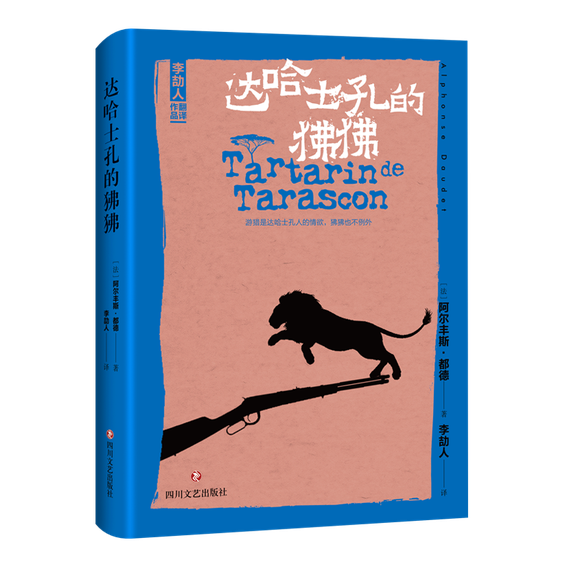By Julien Masurel (Diplôme par le Gouvernement, DPLG)
Montpellier and Chengdu were the first sister cities established between France and China. In May 2025, a new chapter unfolded between these two cities separated by thousands of miles.
Michael Delafosse, the mayor of Montpellier, France, along with his municipal team, officially named a new square in Montpellier’s Antigone district “Li Jieren Square” (Place Li Jieren) during the 40th Festival of Comedy Books.

Michael Delafosse, the mayor of Montpellier, France, and his municipal team unveil “Li Jieren Square” during the 40th Festival of Comedy Books on May 14, 2025. (Photo courtesy of Sichuan Literature & Art Publishing House/ Zhou Zijing)
The location of the square was not chosen at random. This symbolic site is close to the multimedia library dedicated to the French naturalist novelist Émile Zola. Li Jieren from Chengdu has been hailed as the “Chinese Zola” and the “Flaubert of the East”.
Li Jieren went to France to study in 1919 and attended the University of Montpellier from 1922 to 1924. More than 60 years after his passing, he returned to France in this special way. The French square named after Li Jieren is not only a place for sharing opportunities and encounters but also a testament to cultural exchange and friendship between France and China.
My personal connection with China began in 2001. A graduation internship in architecture design brought me to China Shenzhen, where I met my now-wife, Li Shuwen, who is the great-granddaughter of Li Jieren.
That was my first time coming to China. Having grown up in Paris, I was deeply impressed by the vitality of Shenzhen. The city’s tolerance, openness, and abundance of opportunities sparked my curiosity about China.
Li Shuwen and I lived in Paris, France, for five years. Later, I decided to follow her and settle in Beijing. In Beijing, whether it’s the architectural heritage, the occasional sound of Peking opera drifting through the parks, or even the conversations with people in the alleyways of hutongs, Chinese culture is vividly presented through its people. To me, this is far more impressive than the famous landmarks.
To be honest, before coming to China, I had never heard of Li Jieren. When I learned that Li Shuwen’s great-grandfather had ties to France, I became very curious, especially when I discovered that Li Jieren had a high reputation in the literary world of both China and France.
Li Jieren’s works Ripples Across Stagnant Water, The Calm Before the Storm, and The Great Waves form the “Great River Novel Trilogy”, which Mao Dun called a monumental achievement in the history of modern Chinese literature. The first novel by Li Jieren that I read was Ripples Across Stagnant Water.
I started with the English version of Ripples Across Stagnant Water, and then I read the first French edition of Dead Waters, translated by Ms. Wen Jinyi. The English version was easier to digest, the French version was somehow more difficult.
Although the French version is not perfect, I believe it is still an important work. It brings Chinese literature and the social realities of China to French readers, much like what Li Jieren did when he translated French literary classics and introduced French culture to China. Perhaps this is the great meaning of a first translation—discovering and exploring new cultures.
Li Jieren translated numerous works by French writers such as Alphonse Daudet and Guy de Maupassant. These works provide detailed depictions of real life, reflecting on and critiquing the people from different social classes and the society. These authors are regarded as part of the realist and naturalist movements, and are still commonly studied in French schools today.
I believe it was no coincidence that Li Jieren chose to translate these French literary works. These works resonated deeply with him, and it was this resonance that motivated him to translate and bring them back to China. These works became a bridge for communication between China and the world.
The novels Li Jieren created later in his career indeed shifted focus to the lower classes of society, providing a critical reflection on the realities of the social system.
But Li Jieren was more than a writer or a translator. He was also an entrepreneur and, more importantly, a social activist. Like many other young people who studied in France at that time, such as Deng Xiaoping and Ho Chi Minh, Li Jieren returned to his country and made great contributions in various fields.
When I first met Li Shuwen, she was planning to study abroad. Initially, she didn’t have any intention of going to France, but in the end, she chose to go there. Perhaps in some way, she was retracing the footsteps of her great-grandfather.
I believe that it was no coincidence that Li Jieren’s descendants ended up in France. Looking deeper into Li Shuwen’s family reveals many traces of Sino-French exchanges. Her grandmother was a French interpreter and researcher, while her grandfather studied Northwest African culture in Francophone regions. Her family drinks coffee, enjoys Western breakfasts, and even havs a butter knife at home.

Photo shows Li Jieren’s Chinese translation of Tartarin de Tarascon. (Photo courtesy of Sichuan Literature & Art Publishing House)
It should be noted that Li Jieren was also a gastronome. At his home in Chengdu, he would prepare meals using vegetables grown in his own garden. Fortunately, Li Jieren passed this talent down to his descendant, Li Shuwen.
I absolutely love the saozi noodles (noodles with minced meat) that Li Shuwen makes. It’s a very simple and heartwarming Chinese dish. When we eat saozi noodles, my wife always reminds everyone to take only a small portion at a time, finishing it before taking more. She repeatedly explains that this method of eating and serving it was passed down from Li Jieren’s family and differs from common practice elsewhere.
When I learned about the naming of “Li Jieren Square” in Montpellier, I felt both proud and hopeful. It is a recognition of a great Chinese writer who loved the French language and shared similar social views with the French authors he translated.
In an increasingly divided world, this square represents an open attitude and stance.
Edited by An Yingzhao and Han Yu
![]()
![]()
www.ecns.cn (Article Sourced Website)
#Talk #French #Square #Named #Chinese #Writer
